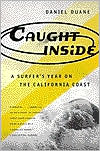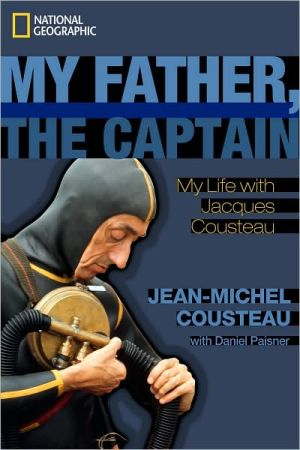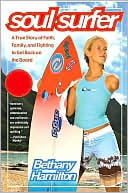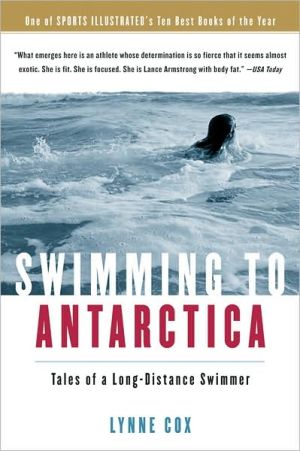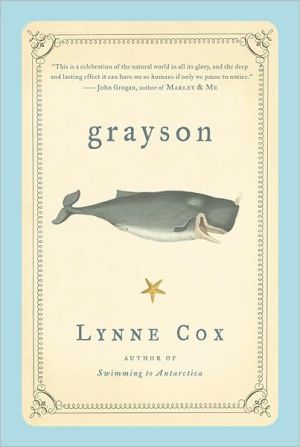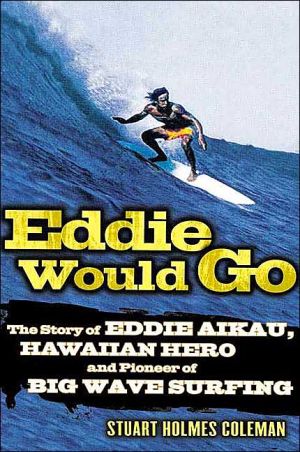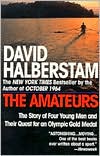Caught Inside: A Surfer's Year on the California Coast
A wondrous, uproarious, and surprisingly informative account of a year spend surfing, Caught Inside marks the arrival of an exuberant new voice of the outdoors. This remarkable narrative of Daniel Duane’s life on the water is enhanced by good-humored explanations of the physics of wave dynamics, the intricate art of surfboard design, and lyrical, sharp-eyed descriptions of the flora and fauna of the Pacific wilderness. From Captain Cook and Mark Twain to Robinson Jeffers and Jack London, from...
Search in google:
A wondrous, uproarious, and surprisingly informative account of a year spend surfing, Caught Inside marks the arrival of an exuberant new voice of the outdoors. This remarkable narrative of Daniel Duane’s life on the water is enhanced by good-humored explanations of the physics of wave dynamics, the intricate art of surfboard design, and lyrical, sharp-eyed descriptions of the flora and fauna of the Pacific wilderness. From Captain Cook and Mark Twain to Robinson Jeffers and Jack London, from portraits of famous (and infamous) surfers to an analysis of Gidget’s perverse significance, Duane expertly uncovers the myths and symbols bound up in one of our most vibrant and recognizably American subjects. Bruce Barcott "A surf break can be a Walden Pond," writes Daniel Duane, "a material synecdoche of all one finds mysterious and delightful about the world." Unfortunately, there is little of the mysterious or delightful in Duane's chronicle of Northern California surf culture. Finding himself 27 and unemployed, the author takes a year off to go surfing. He orders a custom board, finds an out-of-the-way break he can call his own and paddles out. Caught Inside begins with promising descriptions of the insiderish nature of surfing, including this dead-accurate reading of surf magazine photo captions: "Where climbing, skiing. . . and hite-water magazines identify every place in every photograph, with detailed travel and camping information, surfing magazines do their level best to disguise them: Delighted you bought the mag, but please, don't ever come here." The author leavens his seasonal diary with interesting histories of surfing, shark attacks and odd characters like Mickey "Da Cat" Dora, an early Malibu surf icon. Too soon, however, the book bogs down in Duane's overwritten descriptions of surf spots, and by the end the reader feels trapped in a home slide show in which the host insists on describing every otter, bird, kelp bed and sunset he encountered atop his fiberglass float. Duane's enchantment with the sport is obvious, but his narrative doesn't so much celebrate surfing as inadvertently expose it. "Da Cat" turns out to be an ugly character, the world's first surf Nazi. Duane's friend Vince is so scared of getting assaulted by locals that he's afraid to speak above a whisper. A supposedly cool surf buddy spits on the windshield of two visiting surf enthusiasts because he thinks they're posers. Other friends cheat the same visitors out of a $1500 van. By the time the book ends, the surfing life seems more distasteful than romantic. Sometimes a surf break's a synecdoche, and sometimes it's just a holding pond for a jerkwater navy. -- Salon
\ Bruce Barcott"A surf break can be a Walden Pond," writes Daniel Duane, "a material synecdoche of all one finds mysterious and delightful about the world." Unfortunately, there is little of the mysterious or delightful in Duane's chronicle of Northern California surf culture. Finding himself 27 and unemployed, the author takes a year off to go surfing. He orders a custom board, finds an out-of-the-way break he can call his own and paddles out. Caught Inside begins with promising descriptions of the insiderish nature of surfing, including this dead-accurate reading of surf magazine photo captions: "Where climbing, skiing. . . and hite-water magazines identify every place in every photograph, with detailed travel and camping information, surfing magazines do their level best to disguise them: Delighted you bought the mag, but please, don't ever come here." The author leavens his seasonal diary with interesting histories of surfing, shark attacks and odd characters like Mickey "Da Cat" Dora, an early Malibu surf icon.\ Too soon, however, the book bogs down in Duane's overwritten descriptions of surf spots, and by the end the reader feels trapped in a home slide show in which the host insists on describing every otter, bird, kelp bed and sunset he encountered atop his fiberglass float. Duane's enchantment with the sport is obvious, but his narrative doesn't so much celebrate surfing as inadvertently expose it. "Da Cat" turns out to be an ugly character, the world's first surf Nazi. Duane's friend Vince is so scared of getting assaulted by locals that he's afraid to speak above a whisper. A supposedly cool surf buddy spits on the windshield of two visiting surf enthusiasts because he thinks they're posers. Other friends cheat the same visitors out of a $1500 van. By the time the book ends, the surfing life seems more distasteful than romantic. Sometimes a surf break's a synecdoche, and sometimes it's just a holding pond for a jerkwater navy. -- Salon\ \ \ \ \ \ Publishers Weekly - Publisher's Weekly\ Surfing enthusiast Duane quit his unfulfilling retail job in Berkeley, Calif., and moved to Santa Cruz, where he spent the better part of a recent year riding waves, exploring the coastline, researching the history of surfing and befriending and philosophizing with various locals who have arranged their lives around the quest for the perfect wave. The results of these pursuits are recorded here in quietly meditative prose that simultaneously deglamorizes the sport and seeks to imbue it with a kind of metaphysical profundity. Dedicated surfers, Duane discovers, tend to feel a measure of guilt about their willingness to give their favorite pastime precedence over career ambitions and family responsibilities. At the same time, surfing yields unique and valuable opportunities for appreciation of and communication with nature. Duane is clearly anxious to justify an ostensibly hedonistic lifestyle, and his arguments on its behalf are not always convincing, but the deftly rendered observations and epiphanies make his own experience seem decidedly worthwhile. (June)\ \ \ Kirkus ReviewsDuane (Lighting Out, 1994) is a surf hound, doubtless, but he explores a whole lot more than great green rooms of tubular water in this testament to an obsession.\ The narrative starts with Duane drowning, nearly, pounded by the waters of the Point, his chosen venue, a slice of the Pacific Ocean off Monterey Bay. Neither new to surfing nor a veteran, Duane wanted to spend an intimate year with the waves, to feel their soothing, healing effects and astounding violence, to live the surfer's life. But sliding down the water's face is only part of the process; he wanted the whole zeitgeist, and he delivers it with easy precision. The technicalities are handled with aplomb: how to craft a board, from the old 18-foot Hawaiian prototypes to today's 7-foot shredding marvels; how to interpret the color of the water, the vectors of wind and swell. He conveys a physicist's appreciation of wave forms—frequencies and amplitudes and periods, energy as measured by joules per second. He is an appreciative audience for the natural world during walks to the beach, seeing and describing mustard and hemlock, cougar and bird. On the water, he explains traffic rules and pecking orders (more than once falling foul of the strictures); up and running he dips a "finger in the water just to believe it's happening, and feel the light joy of effortless, combustion-free speed"; surrounded by a pipe of water, he "physically penetrates the heart of the ocean's energy," then gets slammed onto the deck once again. Duane willingly takes his knocks. Utterly intriguing are the psycho-probings he assays with his surfing friends into the fanaticism of surfers, how it reflects their past, brackets their love lives, defines their expectations.\ Duane wrestles poetry from the surf's chaos—wild and vital, supple and elegant.\ \ \
